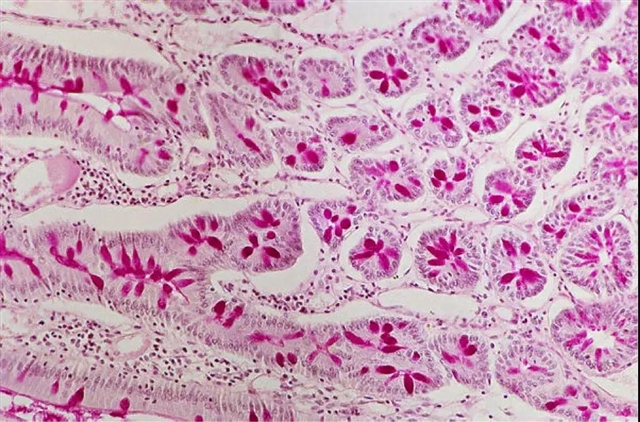|
|
|
|
|
粘液和粘蛋白:它们在抑制HIV病毒时起作用吗?| Virology Journal |
|
|
论文标题:Mucus and Mucins: do they have a role in the inhibition of the human immunodeficiency virus?
期刊:Virology Journal
作者:Anwar Suleman Mall, Habtom Habte, Yolanda Mthembu, Julia Peacocke and Corena de Beer
发表时间:2017/10/06
数字识别码:10.1186/s12985-017-0855-9
原文链接:https://virologyj.biomedcentral.com/articles/10.1186/s12985-017-0855-9?utm_source=other&utm_medium=other&utm_content=null&utm_campaign=BSCN_2_DD_Sciencenet_Article
微信链接:https://mp.weixin.qq.com/s/TlYQQlcsOa4nEqUweZQX3Q
人类免疫缺陷病毒(HIV)已导致了一个全球性的瘟疫,而撒哈拉沙漠以南的非洲是全球HIV-AIDS最盛行的地方。在15至24岁的南非人群里,有15%的年轻女性和大约5%的年轻男性是HIV阳性。
Anwar Suleman Mall等人在Virology Journal上发表的一综述文章揭示了粘液和黏蛋白在抑制人类免疫缺陷病毒方面的作用。

南非的九个省内共有大约六百万HIV阳性的患者,其中属夸祖鲁-纳塔尔省和豪登省的案例最多。在这里,主要的病毒传染途径包括性交时通过阴道上皮表面传播或在母乳喂养时从母亲传至婴儿。Fultz在1986年提出,HIV不能通过口腔传染是因为唾液有抗HIV的活性。因此有人推测,唾液里有负责把HIV中和的大分子成分,比如唾液粘蛋白。以后的研究显示,未被加工的唾液和唾液粘蛋白对HIV-1有抑制作用。唾液里的非粘蛋白成分,比如唾液凝聚素,也显示了抗HIV的活性。进一步的研究发现,从母乳或阴道子宫这些高传染度的区域提纯粘蛋白也有很强的抗HIV-1的活性。作者们随后探讨了用粘蛋白来制造具有生物基础的生物相容性物质的可能性,该物质可作为防止病毒传播的局部预防剂。

粘蛋白是一个O-连接的大型糖化蛋白,它赋予粘液成胶的特性。有体外试验显示:唾液、母乳、 和宫颈塞含有的粘液以及它们含有的粘蛋白能够抑制HIV病毒(HIV-1)。
在许多人体器官内腔的上皮表面上,未经加工的粘液胶形成了连续不断的层面并保护上皮表面使其不受侵略性物质的冲击, 比如在胃腔里减少了盐酸和胃蛋白酶的水解反应带来的破坏,在大肠里降低了肠道蠕动时干硬大便产生的压力,在阴道里减少了性交带给的切变影响,以及降低了外来物质对呼吸道的伤害。粘蛋白含有与肿瘤有关的表位。在治疗上皮表面恶性癌细胞时,这些表位适合做引导免疫治疗的靶点。所以粘蛋白成为了诊断和预报多种疾病的重要标志,甚至可以影响以粘蛋白为基础的疫苗的设计。
研究者们发现,在一个体外试验里,未加工的唾液和其提纯的粘蛋白(MUC5B和MUC7),以及提纯自母乳的的粘蛋白(MUC1和MUC4)和来自孕妇的宫颈塞的黏蛋白(MUC2,MUC5AC,MUC5B和MUC6),能够抑制HIV-1。现有的研究在粗提母乳是否能够防止HIV-1的问题上有互相矛盾的结论。然而,在人源化的BLT小鼠上的研究显示,母乳的确能够抑制HIV。即使在资源缺乏地区的HIV阳性妇女中,母乳喂养仍然是可取,而且适合与抗病毒治疗同时进行。
这些研究结果催生了一个疑问,即:如何使用诸如粘液这种具有对上表皮显著的保护作用的并且可以抵抗敏感部位受到攻击的生物物质来作为防治艾滋病的工具,这仍然是一个值得深入探讨的问题。
摘要:
Background
Mucins are large O-linked glycosylated proteins which give mucus their gel-forming properties. There are indications that mucus and mucins in saliva, breast milk and in the cervical plug inhibit the human immunodeficiency virus (HIV-1) in an in vitro assay.
Main body of abstract
Crude mucus gels form continuous layers on the epithelial surfaces of the major internal tracts of the body and protect these epithelial surfaces against aggressive luminal factors such as hydrochloric acid and pepsin proteolysis in the stomach lumen, the movement of hard faecal pellets in the colon at high pressure, the effects of shear against the vaginal epithelium during intercourse and the presence of foreign substances in the respiratory airways. Tumour-associated epitopes on mucins make them suitable as immune-targets on malignant epithelial cells, rendering mucins important as diagnostic and prognostic markers for various diseases, even influencing the design of mucin-based vaccines.
Sub-Saharan Africa has the highest prevalence of HIV-AIDS in the world. The main points of viral transmission are via the vaginal epithelium during sexual intercourse and mother-to-child transmission during breast-feeding. There have been many studies showing that several body fluids have components that prevent the transmission of HIV-1 from infected to non-infected persons through various forms of contact.
Crude saliva and its purified mucins, MUC5B and MUC7, and the purified mucins from breast milk, MUC1 and MUC4 and pregnancy plug cervical mucus (MUC2, MUC5AC, MUC5B and MUC6), inhibit HIV-1 in an in vitro assay. There are conflicting reports of whether crude breast-milk inhibits HIV-1 in an in vitro assay. However studies with a humanised BLT mouse show that breast-milk does inhibit HIV and that breast-feeding is still advisable even amongst HIV-positive women in under-resourced areas, preferably in conjunction with anti-retroviral treatment.
Conclusion
These findings raise questions of how such a naturally occurring biological substance such as mucus, with remarkable protective properties of epithelial surfaces against aggressive luminal factors in delicate locations, could be used as a tool in the fight against HIV-AIDS, which has reached epidemic proportions in sub-Saharan Africa.
阅读论文全文请访问:
https://virologyj.biomedcentral.com/articles/10.1186/s12985-017-0855-9?utm_source=other&utm_medium=other&utm_content=null&utm_campaign=BSCN_2_DD_Sciencenet_Article
期刊介绍:
Virology Journal (https://virologyj.biomedcentral.com/,2.465 - 2-year Impact Factor, 2.373 - 5-year Impact Factor)is an open access, peer reviewed journal that considers articles on all aspects of virology, including research on the viruses of animals, plants and microbes. The journal welcomes basic research as well as pre-clinical and clinical studies of novel diagnostic tools, vaccines and anti-viral therapies.
(来源:科学网)
特别声明:本文转载仅仅是出于传播信息的需要,并不意味着代表本网站观点或证实其内容的真实性;如其他媒体、网站或个人从本网站转载使用,须保留本网站注明的“来源”,并自负版权等法律责任;作者如果不希望被转载或者联系转载稿费等事宜,请与我们接洽。